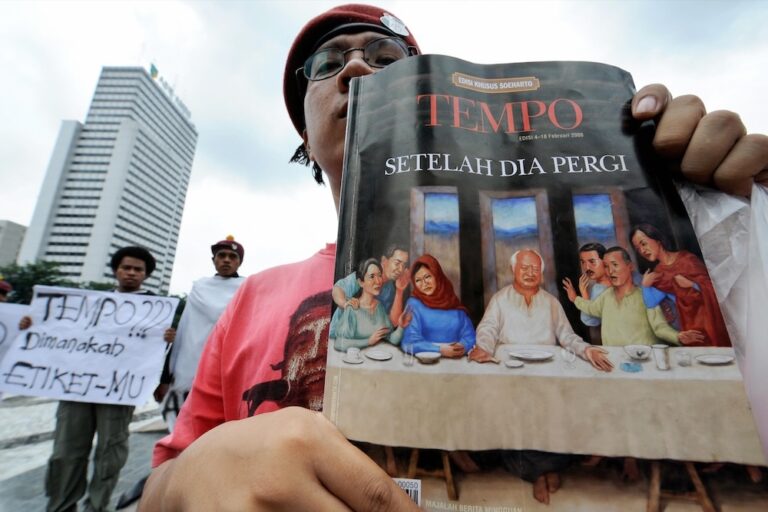In a recent incident, journalist Joseph Dervish was attacked after reporting on allegations of fraud and budget misuse for a fishpond project.
UPDATE: Time running out in seeking justice for slain journalist in Indonesia (SEAPA, 21 November 2012)
(AJI/IFEX) – 30 May 2012 – The Alliance of Independent Journalists (AJI) Indonesia condemned the rising cases of violence against journalists the country. From January to May this year, there have been at least 20 cases of violence committed against journalists. Violence against journalists is an indicator of the State practice of impunity for the perpetrators.
The most recent cases of violence occurred on Tuesday, 29 May, when a dozen Navy soldiers in Padang beat up, forcibly seized cameras, and confiscated video tapes and memory cards from journalists in the Bukit Lampu region, in Lubuk Begalung district, Padang city in West Sumatra.
The attack wounded seven journalists, including Budi Sunandar, a Global TV journalist; Sy Ridwan, a Padang Express photographer; Jamaldi, a Favorite TV journalist; Andora Khew, an SCTV journalist; Julian, a Trans 7 journalist; Afriandi, a Metro TV journalist; and Deden, aTrans TV journalist. The perpetrators also damaged and confiscated the journalists’ work equipment.
Also on 29 May, there was an incident at the Morowali regency, Central Sulawesi. Reny Sri Ayu, a Kompas Daily journalist, and Moechtar Mahyuddin, a Mercusuar Daily journalist, were attacked by villagers while covering a queue of residents lining up for fuel at a gas station.
Earlier, on Monday, 28 May, a man dressed in an Army uniform seized the camera of Bangong Sastra Negara, a BatamTV camera journalist who was covering fuel shortages in Simpang Tobing, Batam city.
On 23 May, Joseph Dervish (53), a journalist from Bongkar Daily, was stabbed in the shoulder by Kadarsyah, head of the North Lampung fisheries department. Dervish was stabbed in front of Kandarsyah’s office, and it is believed that the attack was related to news items in Bongkar Daily about allegations of fraud and budget misuse for a fishpond project costing 3.4 billion Rupiah (approx. 336,000 USD), located on lands owned by Abung Surakarta district residents, in the North Lampung regency. Dervish sustained a wound on his shoulder requiring 23 stitches.
These recent incidents add to a long line of cases of violence against journalists. AJI Indonesia has recorded at least 20 cases of violence against journalists from January to May this year. The perpetrators include the police (5 cases), a member of the Regional Representatives Council (3 cases), local government civil servants (3 cases), elements of the TNI (or armed forces, 2 cases), community organizations (2 cases), student organization (1 case), villagers (2 cases), a company security officer (1 case), and an unknown perpetrator (1 case).
“Cases of violence against journalists are mostly committed for the State by law enforcement officials, and continue the pattern of impunity that places perpetrators above the law. As a result, there is no deterrent effect. In many cases, people are also ignorant about the protection of journalists as a profession,” said Aryo Wisanggeni G, Advocacy Division coordinator of AJI Indonesia.
Impunity of perpetrators of violence against journalists extends the same pattern of impunity for the eight journalist murders that have been committed since 1996. The eight cases of killings of journalists include the unsolved murder of Fuad Muhammad Syarifuddin, alias “Udin”, a Bernas daily journalist in Yogyakarta, who was killed on 16 August 1996; Naimullah, an Early Light Daily journalist in West Kalimantan, found dead on 25 July 1997; Agus Mulyawan, an Asia Press journalist in East Timor, killed on 25 September 1999; Muhammad Jamaluddin, a TVRI camera journalist in Aceh, found dead on 17 June 2003; Ersa Siregar, an RCTI journalist, killed in Aceh in December 2003; Herliyanto, a freelance journalist for the Delta Pos Sidoarjo tabloid in East Java, found dead on 29 April 2006; Adriansyah Matra’is Wibisono, a local TV journalist in Merauke, Papua, found dead on 29 July 2010; and Alfred Mirulewan, a Rainbow tabloid journalist in Maluku, found dead on 28 December 18, 2010.
“If the murders of journalists have been ignored, how can we expect action on other cases of violence against journalists? Journalists who work under the threat of violence would be afraid to report full information to the public. It threatens the constitutional rights of citizens to obtain information. Violence against journalists is not only detrimental to journalists, but is also detrimental to the public and every citizen,” said Aryo.
AJI Indonesia urged law enforcement agencies both from the Police and TNI to take action against the perpetrators of violence against journalists. AJI Indonesia also urged the government to prosecute perpetrators from within the framework of the Press Law (Law Number 40, 1999), in order to encourage awareness of every citizen that journalists are protected as a profession.


